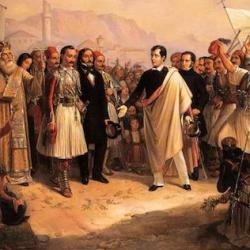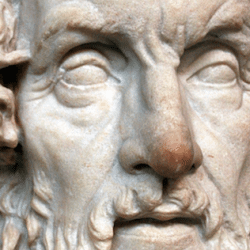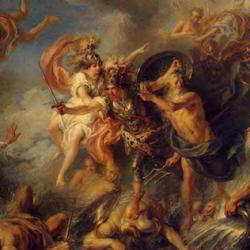After reading through a stack of papers on Aeschylus’s Oresteian trilogy, a few thoughts have occurred to me, mainly having to do with my unbegun and doubtless forever unfinished work on the atonement, sacrifice, and so on. Essentially, these thoughts all boil down to one question: What would Aeschylus have made of the gospel? What would he have made of a suffering and bleeding God who brings an end to sacrifice? It seems at times that he almost is hoping and wishing for such an outcome, though he ultimately resolves the vengeance cycle through the deus ex machina of a democratic vote, underwritten by the power of Athena.
A few additional thoughts on what might be called the “cultural logic of polytheism,” all inspired by the papers I graded:
1) There have been several books recently examining the association of violence and monotheism, but I suspect that the evidence could be read in the opposite direction — that polytheism is the more inherently violent system. After all, the gods themselves are struggling with one another, so how can we expect human beings to behave themselves peaceably?
2) Polytheism leads inexorably to the imposition of tragic choice. Orestes’s tragic choice (refuse to avenge father and so disobey Apollo; avenge father and so kill mother, and enrage the furies) is bound up with the fact that he gets contrary signals from different deities. A similar point can be made about Agamemnon’s original sacrifice of Iphigeneia: If he doesn’t sacrifice her, then his ships won’t be able to sail and he won’t fulfill his duty of avenging the wrong done to Menelaus; if he does sacrifice her, some other god is going to be enraged. Satisfying one god almost always means enraging another, and so religious choices are always tragic choices.
3) For the same reason, there can be no final propitiation of the gods. If you propitiate Poseidon, you might well anger Apollo or Zeus, and vice versa. Only in a monotheistic world can you have a final propitiation, a final sacrifice, and an end to vengeance.
4) At the end of the Oresteia, Athena casts the deciding vote that gets Orestes off the hook. Thus, in an important sense, Athena casts the vote that establishes her authority in the city. She is self-authenticating. But how can any god or goddess in a polytheistic system be self-authenticating? That seems impossible. Yet, without that self-authentication, the Athenian system will never get founded. Badly stated, that; but there’s something there.















